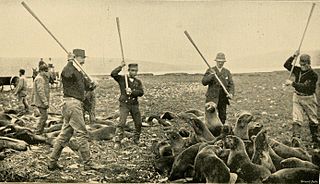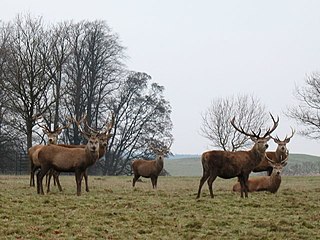
This page gives an overview of the complex structure of environmental and cultural conservation in the United Kingdom.

The Wildlife and Countryside Act 1981 is an Act of Parliament in the United Kingdom implemented to comply with European Council Directive 79/409/EEC on the conservation of wild birds. In short, the act gives protection to native species, controls the release of non-native species, enhances the protection of Sites of Special Scientific Interest and builds upon the rights of way rules in the National Parks and Access to the Countryside Act 1949. The Act is split into 4 parts covering 74 sections; it also includes 17 schedules.

Animal welfare is the well-being of non-human animals. Formal standards of animal welfare vary between contexts, but are debated mostly by animal welfare groups, legislators, and academics. Animal welfare science uses measures such as longevity, disease, immunosuppression, behavior, physiology, and reproduction, although there is debate about which of these best indicate animal welfare.

The Department for Environment, Food and Rural Affairs (Defra) is a department of His Majesty's Government in the United Kingdom responsible for environmental protection, food production and standards, agriculture, fisheries and rural communities in the entire United Kingdom. Concordats set out agreed frameworks for co operation, between it and the Scottish Government, Welsh Government and Northern Ireland Executive, which have devolved responsibilities for these matters in their respective nations.
The League Against Cruel Sports, formerly known as the League for the Prohibition of Cruel Sports, is a UK-based animal welfare charity which campaigns to stop blood sports such as fox hunting, hare and deer hunting; game bird shooting; and animal fighting. The charity helped bring about the Hunting Act 2004 and Protection of Wild Mammals (Scotland) Act 2002, which banned hunting with hounds in England, Wales and Scotland.

Cruelty to animals, also called animal abuse, animal neglect or animal cruelty, is the infliction by omission (neglect) or by commission by humans of suffering or harm upon non-human animals. More narrowly, it can be the causing of harm or suffering for specific achievements, such as killing animals for entertainment; cruelty to animals sometimes encompasses inflicting harm or suffering as an end in itself, referred to as zoosadism.

The Animal Welfare Act was signed into law by President Lyndon B. Johnson on August 24, 1966. It is the main federal law in the United States that regulates the treatment of animals in research and exhibition. Other laws, policies, and guidelines may include additional species coverage or specifications for animal care and use, but all refer to the Animal Welfare Act as the minimally acceptable standard for animal treatment and care. The USDA and APHIS oversee the AWA and the House and Senate Agriculture Committees have primary legislative jurisdiction over the Act. Animals covered under this Act include any live or dead cat, dog, hamster, rabbit, nonhuman primate, guinea pig, and any other warm-blooded animal determined by the Secretary of Agriculture for research, pet use or exhibition. Excluded from the Act are birds, rats of the genus Rattus, mice of the genus Mus, farm animals, and all cold-blooded animals.

Seal hunting, or sealing, is the personal or commercial hunting of seals. Seal hunting is currently practiced in nine countries: United States, Canada, Namibia, Denmark, Iceland, Norway, Russia, Finland and Sweden. Most of the world's seal hunting takes place in Canada and Greenland.

Wildlife management is the management process influencing interactions among and between wildlife, its habitats and people to achieve predefined impacts. It attempts to balance the needs of wildlife with the needs of people using the best available science. Wildlife management can include wildlife conservation, gamekeeping and pest control. Wildlife management draws on disciplines such as mathematics, chemistry, biology, ecology, climatology and geography to gain the best results.
The Humane Society of the United States (HSUS) is an American nonprofit organization that focuses on animal welfare and opposes animal-related cruelties of national scope. It uses strategies that are beyond the abilities of local organizations. It works on issues including pets, wildlife, farm animals, horses and other equines, and animals used in research, testing and education. As of 2001, the group's major campaigns targeted factory farming, animal blood sports, the fur trade, puppy mills, and wildlife abuse.

The Protection of Wild Mammals (Scotland) Act was an Act of the Scottish Parliament passed in February 2002, making Scotland the first part of the United Kingdom to ban traditional fox hunting and hare coursing. It was repealed in 2023.
The Universal Declaration on Animal Welfare (UDAW) is a proposed inter-governmental agreement to recognise that animals are sentient, to prevent cruelty and reduce suffering, and to promote standards on the welfare of animals such as farm animals, companion animals, animals in scientific research, draught animals, wildlife and animals in recreation.
The National Animal Interest Alliance (NAIA) is a non-profit organization in the United States dedicated to promoting animal welfare and animal husbandry practices, strengthening the human-animal bond, and safeguarding the rights of responsible animal owners and professionals through research, public education and public policy. The NAIA mission is "to promote the welfare of animals."

The Animal Health and Welfare (Scotland) Act 2006 is an Act of the Scottish Parliament. It received Royal Assent on 11 July 2006.

Animal welfare in New Zealand is governed by the Animal Welfare Act 1999 and a number of organisations actively advocate for both animal welfare and animal rights. Pest control and farming practices have been scrutinised with respect to animal welfare issues. The legality of killing dogs and cats for consumption has also been criticized.
Wildlife law in England and Wales is the law relating to the protection of wildlife in England and Wales. Much of existing UK law dates from pre-Victorian times. Wildlife was viewed as a resource to be used; phrases such as "game" or "sporting rights" appear. Public opinion is now much more in favour of protection of birds and mammals rather than the landowners’ interests.

Humane Society International Australia (HSIA) is the Australian branch of Humane Society International (HSI), an offshoot of the international animal protection organisation, the Humane Society of the United States (HSUS).
Animal welfare in the United States relates to the treatment of non-human animals in fields such as agriculture, hunting, medical testing and the domestic ownership of animals. It is distinct from animal conservation.

Animal welfare in the United Kingdom relates to the treatment of animals in fields such as agriculture, hunting, medical testing and the domestic ownership of animals. It is distinct from animal conservation.
Animal welfare and rights in Canada is about the laws concerning and treatment of nonhuman animals in Canada. Canada has been considered to have weak animal welfare protections by the organization World Animal Protection. The vast majority of Canadians are for further animal protections, according to a poll conducted on behalf of Mercy for Animals.












